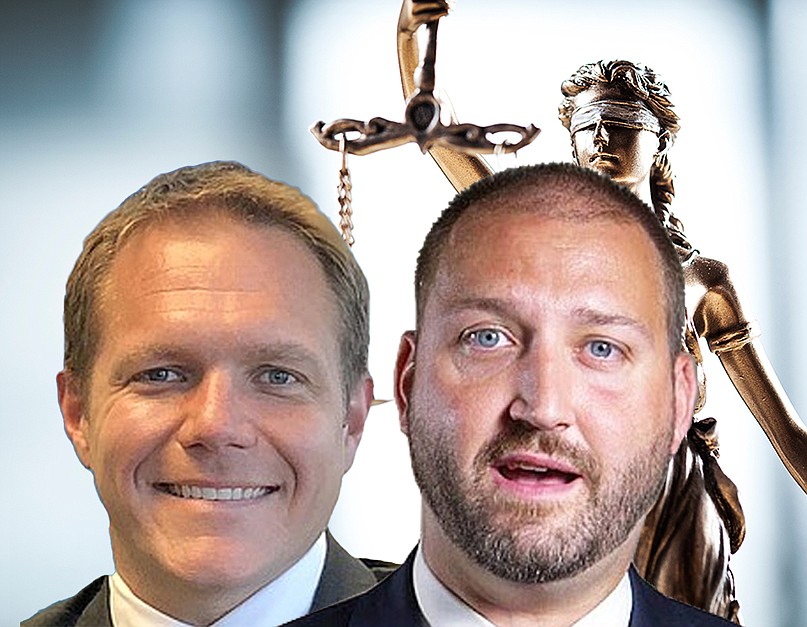
A defense attorney in the federal trial of former JEA executives Aaron Zahn and Ryan Wannemacher presented video clips and other materials Feb. 23 showing members of JEA’s leadership team touting the financial strength of the utility in 2019 under Zahn’s watch.
The video segments, emails and reports came in response to prosecutors’ argument that Zahn and Wannemacher created a false narrative that the city-owned utility was headed toward financial ruin and that selling it was the only way to save it.
The government accuses Zahn, former JEA CEO, and Wannemacher, former chief financial officer, of devising an unlawful incentive plan that would have paid them millions of dollars if JEA had sold.
Among the videos presented by Eddie Suarez, an attorney for Zahn, was a segment of a March 2019 board meeting showing Wannemacher telling board members that JEA had exceeded all of its financial goals in its electrical power operations and posted excellent results in its water and wastewater division.
A clip from the May 2019 board meeting showed Zahn calling JEA a “top-tier performer.”
No ‘death spiral talk’
Cross-examining Angela Hill, the FBI’s lead investigator in the case, Suarez asked if she would “agree with me there was no gloom and doom” in the presentations.
“Correct,” Hill said.
“There was no death spiral talk in those presentations, correct?” Suarez said.
“Correct,” Hill said.
Videos from both sides dominated the Feb. 23 proceeding, to the point where Suarez joked that he was stopping one clip “before the jury starts to believe this is a Martin Scorsese movie that’s going to last three hours.”
Prosecutors presented segments of board meetings and a Council special committee meeting examining the prospective sale and bonus plan.
The materials were offered during testimony by Hill, who spent the entire day on the stand.
Three scenarios
A key focus was a set of three scenarios presented to the JEA board in May through July 2019, one of which involved privatization of the utility. In the July 2019 meeting, the board agreed to explore the sale of the utility and also adopted the bonus plan.
As for the other two scenarios, results included layoffs of more than 550 of JEA’s approximately 2,200 employees, rate increases of up to 26% and discontinuation of the utility’s financial contributions to the city.
Defense attorneys contend the scenarios were offered for planning purposes. They have likened the worst-case scenario to a fire drill, saying it was designed to help decision-makers understand the threats facing the utility.
On Feb. 22, the government showed a video of Zahn telling board members that JEA was facing potentially catastrophic disruptions such as the growing adoption of rooftop solar power and increasing energy efficiency of homes, electrical devices and appliances. He likened the utility to Kodak, which was toppled when digital photography destroyed its film business.
Prosecutors focused on the two scenarios not involving a sale, which were referred to as the “status quo” and “traditional utility response” options. Jurors watched board members say a potential sale could stop JEA’s “death spiral” and was akin to plugging a hole in the hull of a sinking boat.
“In my opinion, when you talk about the traditional response, response 1 or 2, it’s like writing your own obituary,” board member Frederick Newbill said in the July 2019 board meeting. “You know you’re going to die.”
PUP testimony
Other testimony focused on the incentive plan, known as the performance unit plan, or PUP. The program involved offering JEA employees units of payment similar to stocks. The units were to be sold at $10 each and would gain or lose value based on the financial growth or retraction of the business.
The stated purpose of the PUP was to motivate JEA employees to work harder and strengthen the company financially.
Prosecutors claim Zahn and Wannemacher conspired to reap tens of millions of dollars for themselves through the PUP, but were thwarted when the City Council auditor’s office discovered that the potential bonuses were far higher than the JEA board had been led to believe.
The defense contends that Zahn halted implementation of the plan after consulting with attorneys and learning about legal concerns over it.
Prosecutors presented a video of a Dec. 16, 2019, meeting in which Council members questioned Zahn and Wannemacher about the situation.
Ron Salem, now Council president, told the two at that meeting that several JEA board members had believed the program would provide $3 million to $4 million in bonuses across the entire JEA workforce.
“That was pretty consistent with all the board members I spoke to,” Salem said at that meeting.
The trial, which is expected to last three more weeks, is scheduled to resume Feb. 26 with further testimony from Hill. Other government witnesses are expected to include Kyle Billy, the Council auditor in 2019, and current Council auditor Kim Taylor.